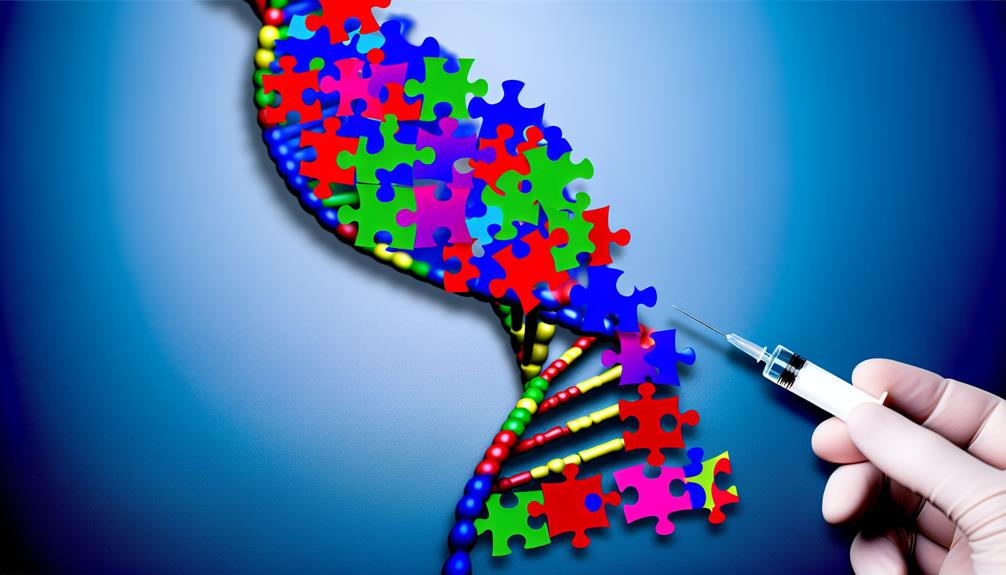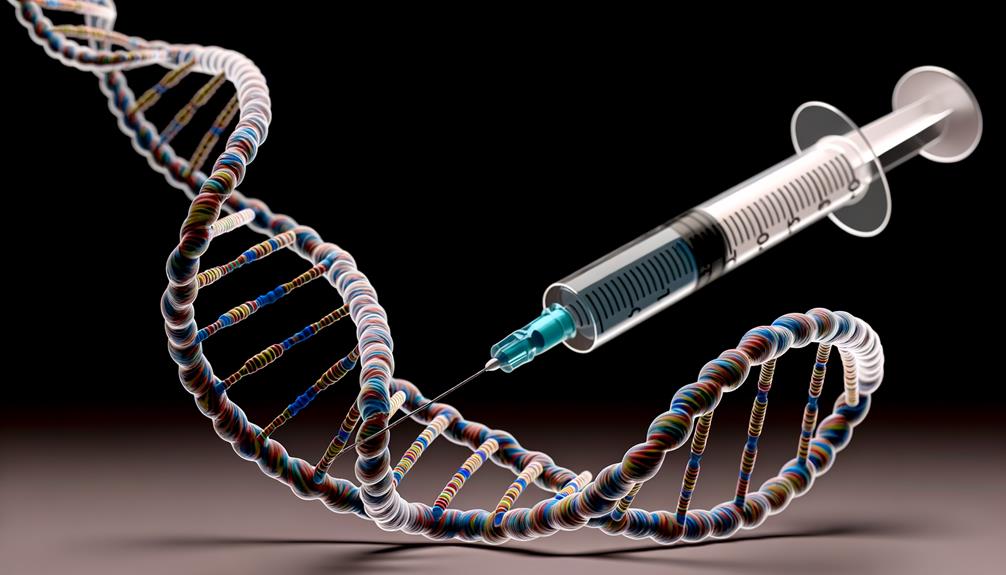Did you know that genetic factors play a significant role in opioid addiction? According to recent studies, it has been found that individuals with a family history of addiction are up to four times more likely to develop opioid dependence.
But what exactly does this mean for you or your loved ones? In this practical guide, we will explore the impact of genetic predisposition on opioid addiction, the role of family history, the identification of genetic markers for addiction risk, and the implications for personalized treatment plans.
Understanding the genetic factors behind opioid addiction can provide valuable insights and potentially pave the way for more effective interventions. Stay tuned to uncover the fascinating world of genetics and its connection to opioid addiction.
Understanding Genetic Predisposition

To better understand the role of genetic predisposition in opioid addiction, it's important to delve into the scientific evidence and explore how certain genes can influence an individual's susceptibility to developing this complex disorder.
Genetic testing has emerged as a valuable tool in deciphering the hereditary influence on addiction. Studies have identified several genes that are associated with opioid addiction, such as the OPRM1 gene, which encodes the mu-opioid receptor. Variations in this gene can alter an individual's response to opioids, making them more or less vulnerable to addiction.
Additionally, the COMT gene has been found to be involved in the metabolism of opioids, influencing their effectiveness and potential for abuse. By analyzing an individual's genetic profile through genetic testing, healthcare professionals can gain insight into their risk for developing opioid addiction. This information can be used to tailor prevention strategies and treatment plans, ultimately improving outcomes for those at higher risk.
Understanding the genetic underpinnings of opioid addiction not only helps to explain the variability in individuals' responses to opioids but also highlights the importance of personalized approaches in addressing this widespread issue.
Impact of Family History on Addiction
Family history plays a significant role in the development of addiction, providing valuable insights into the genetic and environmental factors that contribute to an individual's susceptibility. Understanding familial patterns in addiction susceptibility is crucial in identifying those at higher risk and implementing effective prevention strategies.
Research suggests that addiction risk is influenced by both genetic and environmental factors. Studies have shown that individuals with a family history of addiction are more likely to develop addiction themselves. This highlights the interplay between genetic and environmental factors in addiction. While genetic factors contribute to an individual's vulnerability, environmental factors such as exposure to drugs, social influences, and stress can enhance or suppress this susceptibility.
The transmission of addiction risk across generations can be attributed to both genetic and environmental mechanisms. Genetic factors, such as variations in specific genes associated with addiction, can be inherited from parents. Additionally, environmental factors, including family dynamics, parenting style, and exposure to substance use, can shape an individual's vulnerability to addiction.
Recognizing the impact of family history on addiction allows healthcare professionals to tailor prevention and treatment approaches accordingly. By identifying individuals with a familial predisposition, interventions can focus on addressing both genetic and environmental risk factors. Providing education, support, and early intervention can help mitigate the potential negative outcomes associated with addiction susceptibility.
Identifying Genetic Markers for Addiction Risk

What are the genetic markers that can indicate an individual's risk for addiction?
Identifying genetic markers for addiction risk is a complex process that involves genetic testing and understanding the interaction between genes and the environment. Genetic testing allows scientists to examine an individual's DNA and identify specific genes or variations that may contribute to addiction susceptibility.
Here are three key genetic markers that have been identified:
- Dopamine Receptor D2 (DRD2) Gene: Variations in this gene have been associated with a higher risk of substance abuse, including opioids. The DRD2 gene plays a role in the brain's reward system, and alterations in its structure or function can affect an individual's response to addictive substances.
- Opioid Receptor Genes: Genes encoding for opioid receptors, such as OPRM1 and OPRD1, have been linked to opioid addiction susceptibility. Variations in these genes can affect an individual's response to opioids, their pain sensitivity, and their likelihood of developing dependence.
- Glutamate Receptor Genes: Genes encoding for glutamate receptors, such as GRIN2B, have also been implicated in addiction risk. These receptors play a role in the brain's reward circuitry and are involved in the effects of opioids and other addictive substances.
It is important to note that genetic markers alone don't determine an individual's risk for addiction. Gene-environment interactions, such as exposure to certain substances or social factors, also play a significant role in addiction development. Understanding these genetic markers and their interactions with the environment can aid in the development of personalized prevention and treatment strategies for individuals at risk for opioid addiction.
Role of Genetics in Opioid Tolerance
Genetic factors not only contribute to an individual's risk for addiction, but they also play a significant role in the development of opioid tolerance. Opioid tolerance refers to the decreased response to the same dosage of a drug over time, leading to the need for higher doses to achieve the same effect. Several genetic variations have been identified that can influence an individual's response to opioids and their metabolism.
One key genetic variation that affects opioid tolerance is related to opioid metabolism. The enzymes involved in metabolizing opioids can vary among individuals due to genetic differences. For example, variations in the cytochrome P450 enzymes can affect the rate at which opioids are broken down in the body. This can lead to differences in how quickly an individual develops tolerance to opioids.
Additionally, genetic variations in opioid receptors can also impact opioid tolerance. These receptors are the target sites for opioids in the brain, and variations in their structure or function can affect an individual's response to opioids. For example, certain variations in the mu-opioid receptor gene have been associated with increased tolerance and the need for higher opioid doses to achieve pain relief.
Understanding the role of genetics in opioid tolerance is crucial for developing personalized approaches to pain management and addiction treatment. By identifying individuals who may be more prone to developing tolerance, healthcare professionals can adjust medication dosages and monitor patients more closely to prevent overdose and improve treatment outcomes.
Implications for Personalized Treatment Plans

Considering the role of genetic factors in opioid tolerance, personalized treatment plans can greatly enhance the effectiveness of pain management and addiction treatment. By tailoring treatment to an individual's genetic makeup, healthcare providers can develop targeted interventions that address specific needs and minimize adverse effects.
Here are some key implications for personalized treatment plans in the context of opioid addiction:
- Personalized medication: Genetic testing can help identify variations in genes that affect how individuals respond to opioids. This information can guide the selection of medications that are most likely to be effective and minimize the risk of adverse reactions. For example, certain genetic variations may indicate a need for lower opioid doses or alternative pain management strategies.
- Genetic counseling: In addition to genetic testing, genetic counseling can play a crucial role in personalized treatment plans. Genetic counselors can help individuals and their families understand the implications of genetic factors in opioid addiction and make informed decisions about treatment options. They can also provide support and guidance throughout the treatment process, helping individuals navigate the complexities of managing their condition.
- Treatment optimization: Personalized treatment plans allow for ongoing monitoring and adjustment based on an individual's genetic profile and response to treatment. This approach enables healthcare providers to optimize the effectiveness of interventions and minimize the risk of relapse.








